
Is Anurag Kashyap’s exit a wake-up call for Bollywood? Mahesh Bhatt, Viineet Kumar Siingh, Anjum Rizvi, Rahul Bhat and others weigh in – Exclusive | – The Times of India
The Indian film industry, traditionally dominated by Bollywood, is witnessing a notable shift as filmmakers seek creative freedom beyond its conventional boundaries. This trend raises questions about the evolving dynamics of storytelling in Indian cinema.
Anurag Kashyap, a luminary in Indian cinema, has long been celebrated for his unorthodox storytelling and willingness to challenge cinematic norms. However, recent developments have seen Kashyap distancing himself from Bollywood, citing the industry’s increasing prioritization of profit over creativity. This departure not only underscores Kashyap’s personal convictions but also brings to light broader concerns about the current state and future trajectory of Bollywood.
Anurag Kashyap’s Cinematic Journey
Kashyap’s filmography is a testament to his commitment to authentic storytelling. His directorial ventures, such as Gangs of Wasseypur, Dev.D, and Black Friday, have been lauded for their raw portrayal of societal issues and complex characters. These films deviated from mainstream Bollywood formulas, offering audiences a fresh perspective on Indian narratives.
However, Kashyap’s journey has not been devoid of challenges. His 2007 film, No Smoking, faced severe criticism and was a commercial failure, highlighting the industry’s reluctance to embrace experimental cinema. The film’s reception was a stark reminder of the risks associated with diverging from conventional storytelling in Bollywood.
Sharing his experience of working with the filmmaker, actor Rahul Bhat stated, “Anurag Kashyap has a way of pushing actors beyond their comfort zones, sometimes even beyond what they think they’re capable of. Working with him is an exercise in trust—he creates an environment where you can take risks without fear. Watching his films, you see an uncompromising vision, a rawness that isn’t polished for commercial appeal but for truth. He brings out the unpredictability in performances, and that’s what makes his work so compelling.”
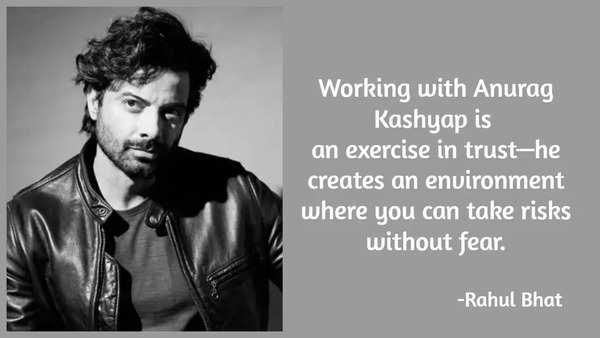
Writer-actor Viineet Kumar Siingh also added, “Working with Anurag Kashyap sir helps me grow as an actor, and the experience gives me a lot of freedom to improvise. Many things get improvised on the spot, allowing me to discover myself as an actor. He always gives me challenging characters, and to achieve them, I push myself, discovering new aspects of my craft. The experience of working with him is very special for any actor. Because of him, I got a chance to work in a film like Gangs of Wasseypur and gained recognition as an actor. So, the credit goes to him.”
A Stand Against Commercialization
Kashyap’s decision to step away from Bollywood stems from his frustration with the industry’s growing emphasis on commercial success at the expense of creative expression. He has expressed discontent with producers who prioritize box office returns over original and meaningful storytelling, leading him to seek a more fulfilling environment in South India’s film industry.
Speaking to The Hindu, he confirmed the move, saying, “I’ve left Mumbai. I want to stay away from film people. The industry has become too toxic. Everyone is chasing unrealistic targets, trying to make the next Rs 500 or Rs 800 crore film. The creative atmosphere is gone.”
Anurag Kashyap has reportedly moved to Bengaluru, citing Mumbai’s stifling culture as a reason for his departure. He noted that many filmmakers have also left for Dubai, Portugal, London, Germany, and the US. Kashyap now feels lighter, healthier, and focused, planning to direct Malayalam-Hindi and Tamil films next.
Mahesh Bhatt aptly describes the current state of Bollywood: “Cinema dies the moment it starts playing safe. And Bollywood today is suffocating under the weight of its own caution.” His words resonate deeply with Kashyap’s concerns, as the industry is no longer driven by instinct or storytelling passion but by algorithms and engagement metrics.
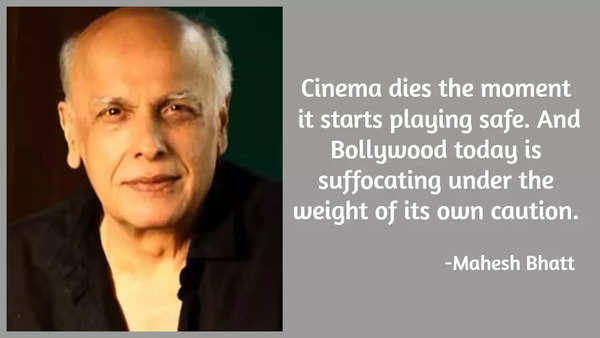
Rahul Bhat also faced equal pressure at a point as an actor. He shared, “Every actor, at some point, faces moments where the industry’s commercial demands clash with personal artistic instincts. There are times when you feel like you have to fit into a certain mold, and that can be frustrating. But I’ve learned that navigating these restrictions is part of the journey—finding ways to inject honesty into even the most structured narratives. The key is to hold onto the work that reminds you why you started in the first place.”
However, Viineet shared, “No, I have never faced creative pressure or restrictions. The directors and producers I have worked with have always shared a beautiful relationship with me. This is evident in my career, as people have repeatedly collaborated with me. I have always received a lot of love from those I have worked with.”
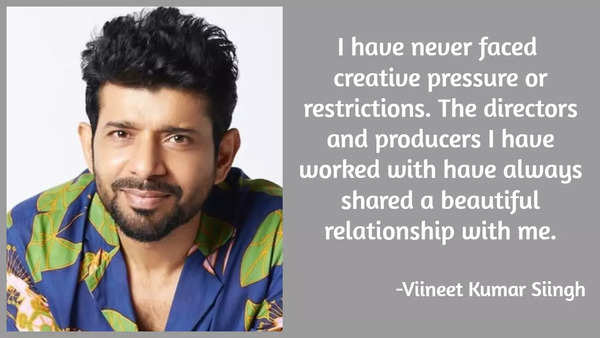
Producer Anjum Rizvi shared, “Yes, the pressure is there, which is why independent producers are unable to work. But for how long? How many films can just a few corporations make in a vast market like India? We need to make more films, but the condition is quality—content and relatable stories. Abstract cinema might not work.”
He further added, “As a producer, I would love to work with filmmakers like Kashyap despite all the pressures. Independent producers are always under pressure anyway.”
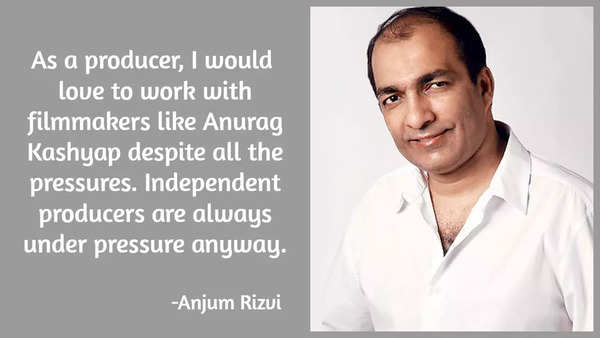
This sentiment is echoed by other filmmakers who have distanced themselves from Bollywood, opting for regional or independent cinema to explore diverse narratives without commercial constraints. This trend suggests a shift in storytelling norms, with creators gravitating towards platforms that value artistic expression over formulaic content.
Commercial pressures in Bollywood often deter filmmakers from taking creative risks. The industry’s obsession with star power and box office numbers can overshadow innovative storytelling, leading to formulaic productions. This environment has prompted some directors to resist mainstream trends, seeking avenues where their creative visions are not compromised.
Mahesh Bhatt further critiques this shift, stating, “Bollywood has always been risk-averse. It has always feared failure and worshipped success. But the films that lasted, the ones that endured the desert of time, were never those that played it safe. They were the ones that broke away—that rejected formulas, that refused to conform.”
Rise of Regional and Indie Filmmaking in India
Regional cinemas, such as those in South India, Marathi, and Bengali industries, have become havens for filmmakers seeking creative freedom. These platforms allow directors to experiment with diverse narratives and styles, attracting audiences appreciative of authentic storytelling. The success of films like Superboys of Malegaon, which follows Bollywood enthusiasts creating DIY spoofs, highlights the potential of independent filmmaking.
Finding Global Platforms
Indian filmmakers are increasingly showcasing their work on global platforms, participating in international film festivals and collaborations. Payal Kapadia’s All We Imagine as Light, which won the Grand Prix at the Cannes Film Festival, exemplifies this trend. Her film blends documentary and fiction to portray the lives of hospital workers in Mumbai, reflecting the constraints faced by women in a patriarchal society.
The Toxicity in Bollywood: Nepotism, Power Struggles, and the Fight for Authentic Cinema
Bollywood has faced criticism for practices like nepotism and power struggles, which can hinder the emergence of fresh talent and authentic cinema. Filmmakers who challenge these norms often struggle to break through, despite critical acclaim. Addressing these systemic issues is crucial for fostering a more inclusive and innovative cinematic landscape.
As Mahesh Bhatt insightfully states, “So when Anurag Kashyap calls Bollywood ‘too toxic,’ he is mourning the death of that defiance. This isn’t just about commercialism—it’s about an industry that now prescribes conformity like a rule, that punishes unpredictability, that suffocates anything that doesn’t fit the model. It’s not just risk-averse. It’s risk-intolerant.”
These developments indicate a transformative period in Indian cinema, where the quest for creative freedom is reshaping storytelling norms and expanding the horizons of filmmakers beyond traditional Bollywood confines.
The Path Forward
Kashyap’s move serves as a catalyst for introspection within Bollywood. To retain visionary filmmakers and meet evolving audience expectations, the industry may need to balance commercial interests with creative risks, fostering an environment where innovative storytelling can thrive.
Mahesh Bhatt leaves Bollywood with an urgent warning: “So what defines success today? Numbers? Acclaim? Or the rare film that actually matters? Because in the end, cinema is not about surviving the weekend. It’s about surviving time.”
Bollywood has a choice: remain trapped in the cycle of predictability or burn down the rulebook and start again. As Bhatt states, “True cinema does not seek preservation; it thrives on destruction and renewal. If the industry wants to breathe again, it must first turn to ashes. Only then can something real emerge.”
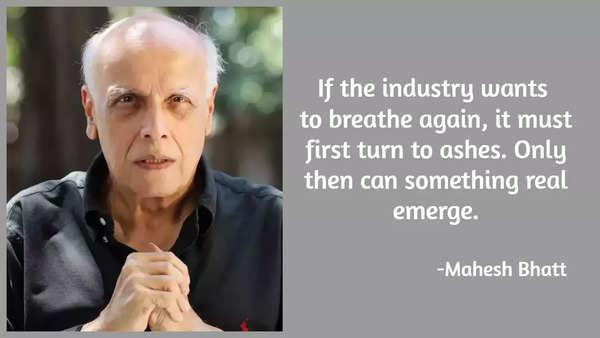
Bhat is also hopeful as he sees the industry moving towards content-driven space. He said, “There’s definitely a shift happening. Audiences today are more open to nuanced, unconventional stories, and the rise of streaming platforms has given space for such narratives. But Bollywood will always have its commercial side—big spectacles, star-driven films—because that’s part of its DNA. The challenge is to strike a balance, to make films that are both engaging and meaningful. I think we’re at an interesting crossroads where both can coexist, and it’s up to filmmakers and actors to keep pushing boundaries.”
Viineet added, “I have noticed that a lot of content-driven films are being made, and people are appreciating them. Recently, if you look at ‘Laapataa Ladies’ and ’12th Fail’, these are both beautiful films. Now, I have a film, Superboys of Malegaon, and audiences are showing interest in such stories. One more thing is that filmmaking requires a lot of money, so I think it’s good to maintain a balance. I always believe that whenever we bring something new, the audience should be prepared to embrace it.”
Rizvi, on the other hand, feels it is a phase that Bollywood is going through and it will eventually pass. He added, “Also, the most important thing is correction. Besides the content, budgets have to be controlled. Unwanted wastage has to be eradicated. As the cliché goes, films don’t fail—budgets fail.”
In conclusion, Anurag Kashyap’s departure from Bollywood highlights the tensions between art and commerce in Indian cinema. It prompts a reevaluation of industry values and practices, urging stakeholders to create a more inclusive space for diverse narratives and experimental filmmaking.